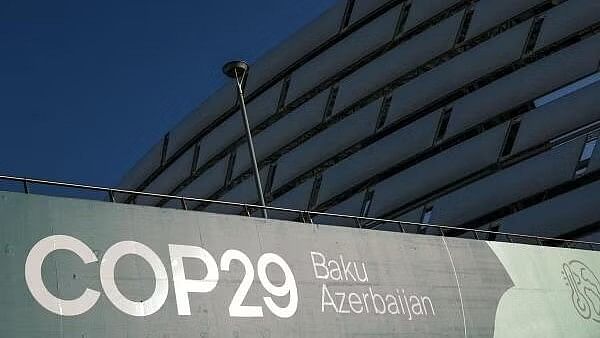
A view shows a venue of the COP29 United Nations climate change conference, in Baku, Azerbaijan.
Credit: Reuters Photo
The agreement reached at COP29 on climate finance which was the main theme of the 12-day-long negotiations is disappointing, and has drawn sharp criticism. The final deal at the UN climate meeting at Baku, Azerbaijan, made during extended hours on Sunday, made a pledge of just $300 billion to be paid annually by rich countries to developing countries who had asked for $1.3 trillion. The funds are for adoption of mitigation and adaptation measures in the face of climate change. $1.3 trillion was mentioned as a target but that could only be taken as an empty projection. The pledged amount marks an increase from the previous $100 billion promise but developing countries have pointed out that it is much less than what is actually needed. The rich countries had earlier made a promise of only $250 billion but agreed to raise it to $300 billion amid protests, walkouts and a suspension of talks for a few hours.
Developing countries, including India, have said that the funds on offer are very inadequate. India has said that the offer is too “little and too distant”. The rich countries have not made good their promise to make annual payments of $100 billion in the last one decade. So there is no guarantee that the larger annual promise of $300 billion by 2035 will be honoured. This year is the hottest in history and there are indications that the situation can get worse in the coming years. Climate finance should progressively increase every year to enable the poorer countries to cope with climate change and to keep the earth from getting hotter. The promised finance is not all cash, but a mixture of grants, concessions, non-debt-creating instruments and others that will appear as cash but is not real money.
The meeting agreed on the much-awaited carbon credit deal which has been discussed for many years and it is expected to facilitate the setting up of a carbon market for countries to meet their Paris commitments. It paves the way for top emitters to buy greenhouse gas emission credits based on decarbonisation schemes in developing countries. It is likely to benefit India. But there is disagreement over the rules for its implementation. The bigger issue that the Baku conference grappled with still remains, and India and many other countries have rejected the deal. There are complaints about how the conference was conducted. India has even said that the decisions were stage-managed. The rich countries continued to disavow their responsibility for legacy emissions, and the trust and collaboration needed to frame an international agreement of such great import was missing in Baku. It will be considered as yet another missed opportunity.